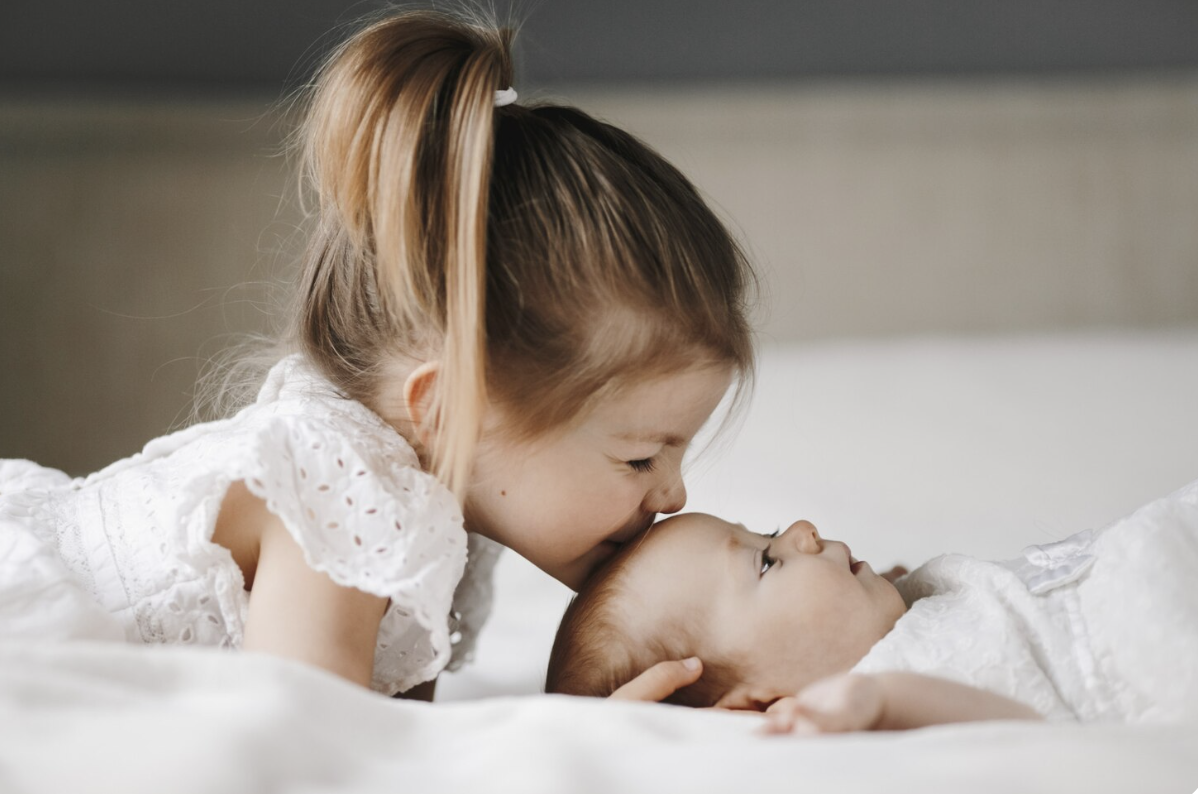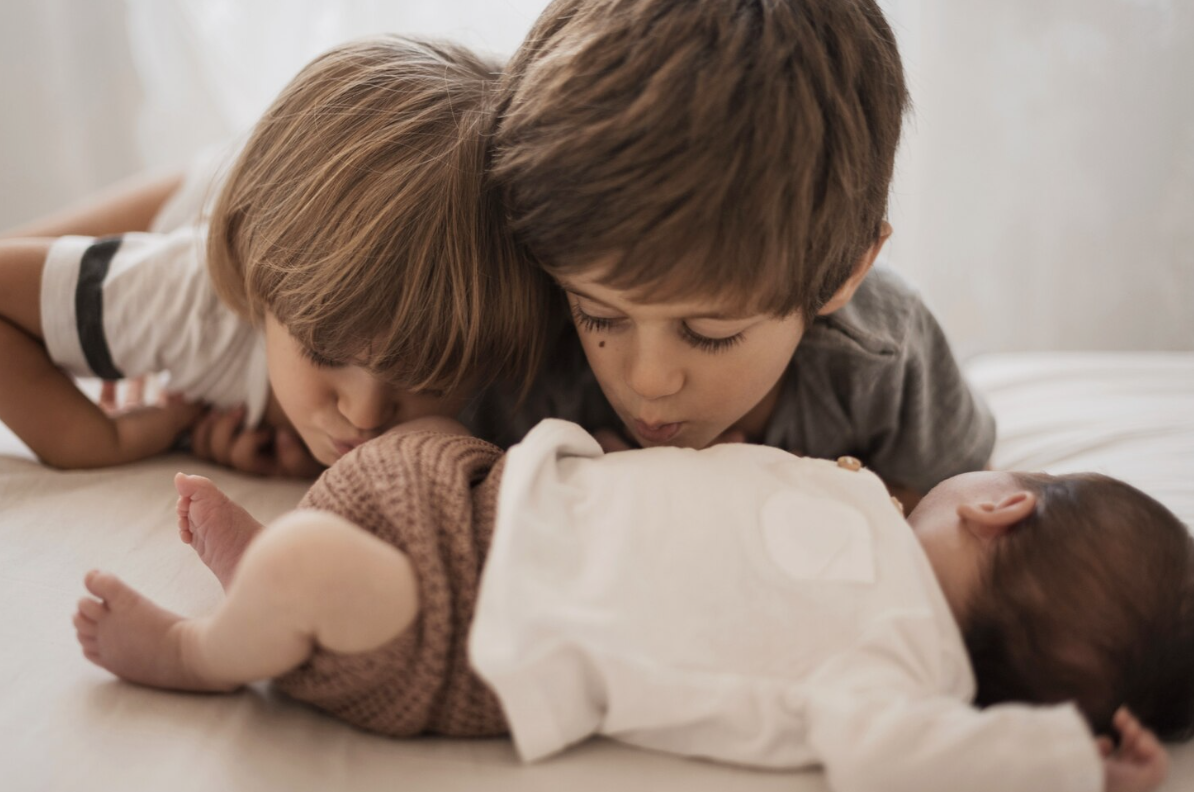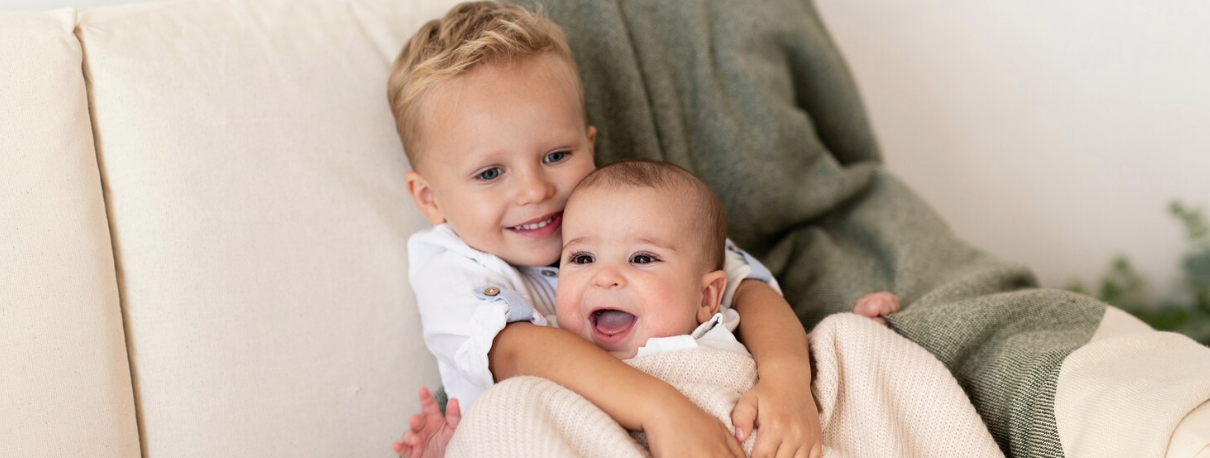Welcoming a New Baby and Preparing Your Toddler for Change
by Anne Ueberbach
Assistant Director / Counsellor
Welcoming a New Baby and Preparing Your Toddler for Change
Welcoming a new baby into your family is an exciting and beautiful time, but it also brings a whole lot of adjustment. For toddlers, the arrival of a baby sibling can stir up a mix of emotions: curiosity, excitement, anxiety, even jealousy. For parents, it’s rarely smooth sailing — you’re juggling sleep deprivation, shifting routines, emotional highs and lows, and often guilt about neglecting the toddler while caring for the newborn.
Despite being a normal transition many families go through, parents may still feel overwhelmed or anxious over introducing a new baby sibling and balancing parenting two young children. But, with the right preparation, understanding, and support, families can emerge with stronger bonds, improved communication, and a healthier sense of wellbeing for everyone.
Preparing for the New Arrival
Start the conversation early
Begin introducing the idea of a new sibling 3-4 months before the baby arrives. Toddlers don’t think well in large time spans, so use concrete language: “After the school holidays,” or “when the leaves turn red.” Invite them to feel your bump, look at ultrasound images, or hear a heartbeat. Reading books about becoming a big sibling and bringing them along to doctor appointments can also be beneficial. These gestures help ground the concept of this baby becoming “real” one day.
Involve Them and Create Inclusion
Let your toddler help. Invite your toddler to help set up the baby's space, pick out clothes, or even pick a toy to “welcome” their sibling. It helps them feel included and valued. In addition, bring out photos of your toddler as a baby. Remind them how fragile and loved they were, which helps them feel seen and valued rather than sidelined.
Keep Routines and Safety Nets Firm
Maintain familiar routines (meals, bedtime, playtime). Stability gives toddlers a safe frame when the rest of the world is shifting. If you plan to shift your toddler’s sleep, space, or schedule (for example, moving from a cot to a bed, or shifting nap timing), attempt that well before the baby arrives. This gives the toddler time to settle into change on gentler terms.
Talk often about what to expect. A toddler might ask if you’ll still play with them, or if the baby will get all the attention. Honest reassurance goes a long way.If you plan to shift your toddler’s sleep, space, or schedule (for example, moving from a cot to a bed, or shifting nap timing), attempt that before the baby arrives. This gives the toddler time to settle into change on gentler terms.
The First Encounter & Early Weeks
The moments when you first bring your newborn home and the following few weeks are often an emotional whirlwind: for the toddler, for you, and for the whole family. How you shape those early interactions can help foster safety, connection, and a smoother transition. The first meeting may not be magical or perfect. The toddler might be shy, overwhelmed, indifferent, or even unhappy. That’s okay. Children are unique: some bond right away, others take more time. What helps is consistency, patience, reassurance. Don’t force interactions. Let curiosity guide the child.
Choose the right time
Plan the first meeting when your toddler is well rested, fed, in a good mood — not when they’re tired, hungry, or overstimulated. A calm toddler is more likely to be receptive and curious. Stressful settings (hospital, lots of people) can overload toddlers.Greeting with love first
Before showing the baby, make sure to give your toddler a warm, undistracted greeting (a hug, some eye contact) so they feel seen. This signals that they’re valued even in the face of big change. Then introduce the baby in their arms or in a safe place where they can gently observe.“Gift from baby” ritual
A small, simple gift from the newborn (or one arranged by parents) for the older child can be meaningful — it gives them something symbolic to hold in hand, an expression that this change also involves them in a positive way.
Adjusting to Change at Home
Helper roles small & safe: Allow your toddler to help in manageable ways: fetching diapers, picking out a onesie, holding a soft toy during bath time. These tasks provide purpose and connection. Even though the toddler can’t do most of the baby care alone, being part of it helps reduce feelings of exclusion.
One‑on‑one time: Set aside short but consistent periods where it’s just you and the toddler — reading, playing, talking. These moments affirm that your love and attention are still there. It doesn’t need to be long; even 10‑15 minutes can make a real emotional difference.
Use familiar routines & safe spaces: Keep bedtime, meals, favourite toys, and spaces stable. When so much else is changing, consistency gives toddlers something they can rely on. Safe, familiar spaces can help them feel emotionally grounding
Expect behaviour changes: Regression (e.g. wanting to sleep in your bed again, wanting more cuddles, tantrums) is common. Rather than seeing these as “naughty”, they are signs of stress, needing comfort.
Anticipate Emotional Challenges
Even with the best preparation, introducing a new baby often brings emotional storms—for your toddler and for you. Toddlers may regress (wanting more cuddles, having sleep disturbances, or behaving in ways they’d outgrown), express jealousy, or act out as they try to understand their new place in the family. At the same time, parents can feel torn between guilt (for not being able to give equal attention), fatigue, overwhelm, and maybe worry about relationship changes or loss of identity.
Understanding that these reactions are normal signals, not failures, is key. Empathy counts:
Name what you see (“You seem sad that I’m feeding the baby right now— that must feel tough”)
Validate the emotion (“It’s okay to feel upset—change is hard”)
Offer reassurance (“I love you just as much. You are special.”).
Toddlers thrive when they feel safe, loved, and secure. Big transitions — like the arrival of a sibling — can challenge those feelings, and stress or anxiety can show in ways like clinginess, irritability, aggression, or withdrawal. For parents, the emotional load can be intense: worries about fairness, guilt, exhaustion, loss of personal identity, or feeling unseen. Over time, if these feelings are left unaddressed, they can contribute to burnout, mood disorders (like postpartum depression or anxiety), or relationship strain.
Because mental health is relational — one person’s wellbeing affects the others — maintaining attention to emotional health isn’t optional, it’s essential for healthy family adjustment. Having realistic expectations about how long the upheaval might last, often weeks or even months of adjustment, also helps. When you’re aware of your own emotional load, you’re in a better position to respond instead of react, and to support both your toddler and yourself through this transition.
Read more about parent-self regulation strategies and what to say to your toddler when you’re emotionally overwhelmed.
How Counselling and Parent Coaching Can Help
At The Counselling Place, we often work with families during this time of transition. Here are ways that counselling, parent coaching, or family therapy can support you:
Safe exploration of feelings
Toddlers might not have the language to express jealousy, fear, confusion. Parents may feel guilt, anxiety, rivalry, imbalance. A counsellor offers a non‑judgmental space to name these emotions, normalise them, and help find healthy ways to cope.Skill building
Coaching can help you develop strategies for managing challenging behaviours, setting boundaries, communicating more clearly, and balancing attention among children. These are concrete tools that make daily life more manageable.Supporting parent wellbeing
When parents are supported themselves — through counselling for stress, anxiety, or adjusting to identity shifts — they are more emotionally available to their children. That means more empathy, patience, and resilience in the face of sibling rivalry or toddler regression.Strengthening family dynamics
Family counselling helps all members (parents, toddlers) see each other’s perspectives, improve communication, reduce sibling rivalry, and build rituals or routines that include everyone. It also helps partners (if applicable) coordinate parenting in ways that feel fair and sustainable.Pre‑empting & Managing more serious concerns
Sometimes symptoms of distress (sleep issues, persistent behaviour problems, parental depression) can escalate. Early counselling involvement can help detect and address these before they become entrenched.
Practical Tips to Foster Emotional Health in the Family
Check in with yourself regularly: how are you feeling? What support do you need?
Model the emotional regulation you’d like your toddler to develop: when you feel frustrated, name it, pause, soothe. Toddlers pick up on parent’s emotional cues.
Encourage the older child to express feelings: draw, talk, play. Let them know all feelings are okay.
Celebrate little successes: when your toddler helps, or shows gentleness, or takes on a helper role — praise it.
Build in moments of joy and connection: family walks, reading together, small rituals that bind the family.
Have regular 1:1 time with your toddler to give them the attention and space to express themselves and bond with you.
Conclusion
Welcoming a new baby is one of life’s most meaningful transitions — but it doesn’t come without wrinkles. Toddlers are learning rapidly about relationships and trust, identity and belonging. Parents are adapting, releasing some routines, rebalancing attention, expectations, and energy.
With intention — through consistent routines, honest communication, emotional awareness, and when needed external support — this transition can become a powerful opportunity. Not just for adapting, but for growing: deeper empathy, stronger sibling relationships, more resilient family bonds, and cultivating emotional intelligence in both the toddler and parent.
If you're navigating fear, weariness, or conflict during this time, remember: you don’t have to do it all alone. Professional support is there to lighten the load, offer perspective, and walk alongside you as your family grows.
About the author
Anne is a a compassionate and experienced counsellor at The Counselling Place Singapore, who empowers her clients to thrive amidst life's challenges. Her expertise across Singapore and Australia spans mental health, career coaching, and multicultural dynamics, informed by her own expat experience and diverse family background.
Anne creates a warm and non-judgmental space for growth and transformation. Her empathetic approach supports individuals, families, and expats navigating life's challenges and transitions





